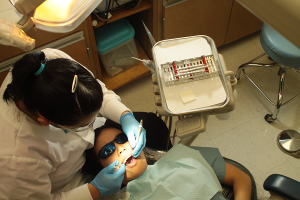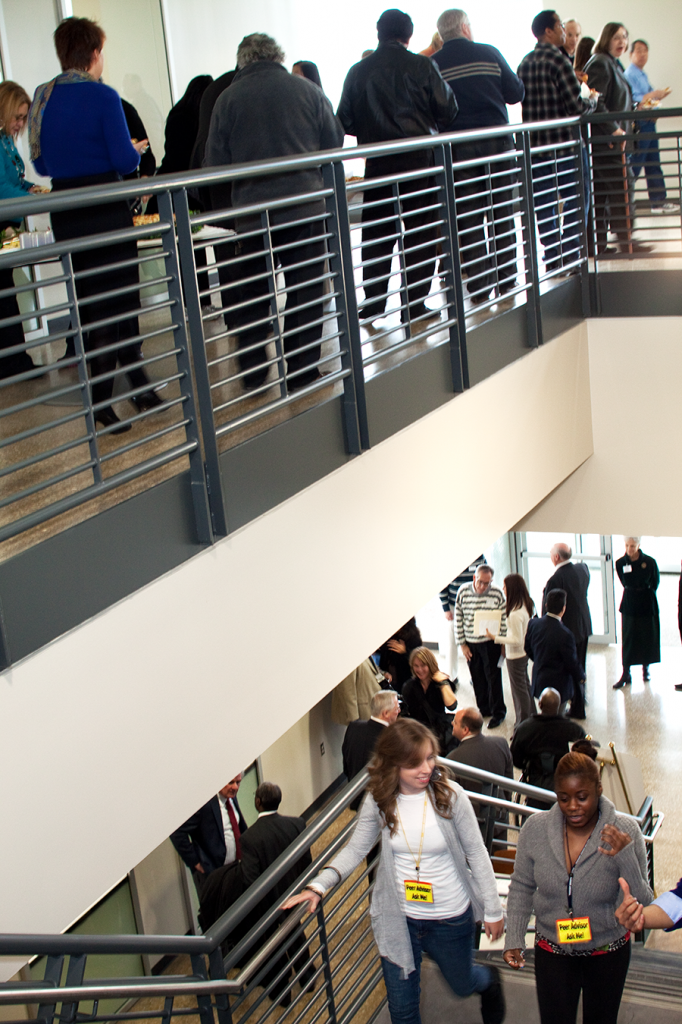By Amber Veytia/reporter

Casey Holder/The Collegian
Some aspects of the federal health care law passed last year may not benefit many TCC students. But even for those students who don’t have health insurance, they still have other options.
As a result of the law, children can stay on their parents’ health coverage until they are 26, whether enrolled in school or not. Last fall, the average age of the 49,108 students enrolled in TCC was 26.03. This means the new legislation will leave much of TCC’s student body still needing to find their own health insurance or some sort of alternative.
Students like Matt Strauss of SE Campus, who doesn’t have coverage but needs to see a doctor or a dentist, can find help from the new law.
“I am relieved that I might be able to see a doctor,” he said.
Students also have other health care choices. The health services office on each campus offers an emergency response team, health counseling, over-the-counter medications, professional assessments and screenings by a registered nurse for blood glucose, blood pressure, vision and weight. Flu shots are also offered at a discounted rate for students. Twice a month, TCC hosts AIDS Outreach, which conducts free HIV and syphilis testing for students.
“If uninsured students need further health care, they are encouraged to apply for the JPS Health Network, which has low- or no-cost health care available at many clinics. We will help students with applying for the JPS Health Network Program,” said SE health services coordinator Elizabeth Lowry.
JPS Connection offers health care for students who fall below certain income guidelines.
“Students don’t even have to go to the main hospital,” NE nurse Tina Ingram said. “There are several really nice satellite clinics around town, and the services can really make a difference for students.”
Students who need to use low- or no-cost health care also can visit multiple federally funded health centers, which provide complete medical care. Students pay only what they can afford based on income. To find locations of the nearest free or low-cost clinics, they can visit http://findahealthcenter.hrsa.gov and type in their address.
“I have not been to a doctor in over five years because I am a single mother with four young children, and I am in college full-time,” NE student Sonya Dehlin said. “I don’t have time to sit in a clinic all day waiting to be seen, and I don’t have
insurance, so I can’t just go to a traditional doctor’s office.”
For some students, a new trend in health care might be just the solution. Flat-rate medical care is popping up all over Tarrant County. CVS pharmacy introduced the Minute Clinic two years ago, Now Clinic’s online doctors see their patients virtually, and just this year, WhiteGlove House Call Health appeared on the scene.
The Minute Clinic is a walk-in clinic located in some CVS pharmacies. Patients do not need insurance to be seen by a nurse practitioner for minor illnesses, and injuries and are charged a flat rate for their treatment. Costs range from $27 to $104 for a visit with the average being $69 for a minor illness.
The Now Clinic puts a technological spin on health care by allowing patients to chat with a doctor online at nowclinic.com or by telephone about symptoms, receive a diagnosis and treatment recommendations or prescriptions for a flat fee of $45.
A WhiteGlove House Call Health employee will come to one’s home, school or office to make a diagnosis. The cost is $35 per month per person with a cap of $88 per month if an entire family signs up for membership. After that, the service is $35 per house call, including generic prescriptions, over-the-counter medications, supportive therapies such as chicken soup or Gatorade or generic prescription medications. Everything is delivered to the patient. This service is available 365 days a year from 8 a.m. to 8 p.m.
“I have not even heard of WhiteGlove, but I think it sounds like a great program for our students,” Ingram said.
Many female students who don’t have insurance are skipping their annual screening tests, but women can have a free Pap smear by going to www.nccc-online.org and registering for the cervical screening.
Women in low-income situations can also get free breast exams, mammograms and Pap smears by calling the Tarrant County Public Health Department at 817-321-5327.
For any students who might have dental issues that need addressing, TCC has a dental clinic on NE Campus, but it is selective and only available seasonally.
All services are provided by students overseen by faculty. Available services include cleanings, sealants and X-rays and cost $2 to $6 for each service.
For free tooth extractions, fillings and cleanings, a non-profit organization called Dentistry from the Heart has dentist volunteers who perform services for a day for free for anyone over 18. The next events in the area will be Feb. 11 and March 11.
Visit www.dentistryfromtheheart.org to learn more about the event locations or to participate.
If students need more extensive dental care than what is offered at the Dentistry from the Heart events, they can do an Internet search to locate an area dental school with reduced treatment costs.
“I really had no idea that these alternatives existed,” Strauss said.



























